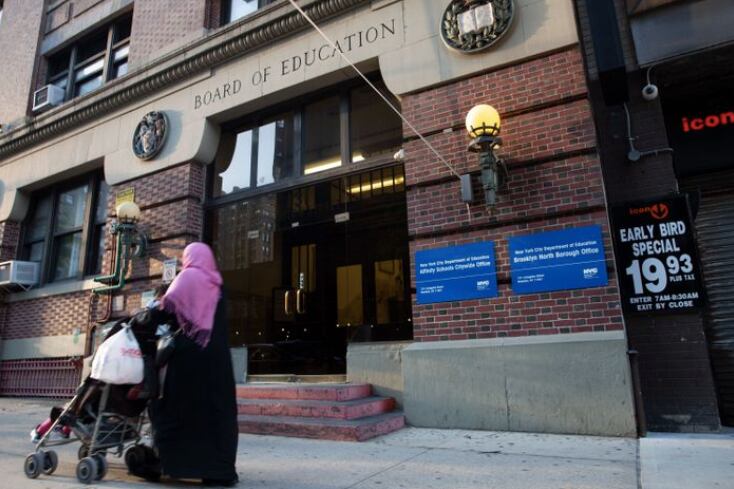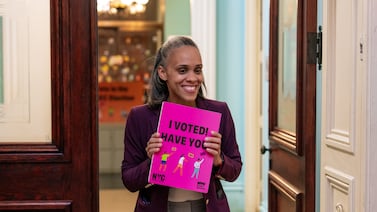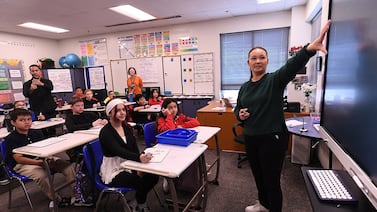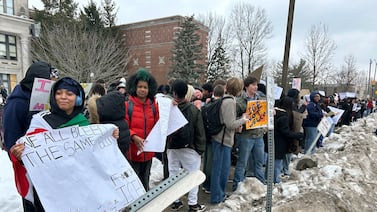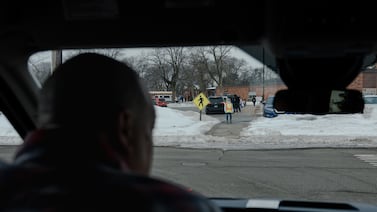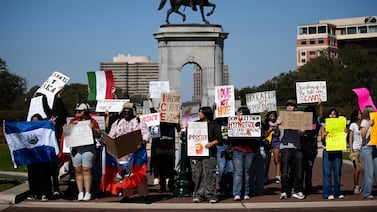This is part of an ongoing collaborative series between Chalkbeat and THE CITY investigating learning differences, special education and other education challenges in city schools. This story was originally published on Nov. 23 by THE CITY.
The city owes thousands of special education students hours of services they haven’t received since the pandemic upended the public school system, a new lawsuit charges — demanding a speedy plan to get the kids needed help.
The federal class action filing by the nonprofit Advocates for Children identifies eight students as complainants who have missed out on legally mandated services during remote learning for a host of reasons — including iPad shortages and the challenge of delivering services such as physical therapy remotely.
The suit also cites a lack of translation and interpretation services for students and parents as an obstacle.
The case argues that the city Department of Education’s current hearings system — under which parents can file complaints to reclaim the counseling, physical therapy and more their kids have been missing out on — is too complicated and costly for most families to navigate.
They say the log-jammed system, which fielded nearly 11,000 complaints in the 2019-2020 school year that took an average of 259 days to resolve, would inevitably move too slowly given the expected flurry of parents seeking services for their children.
“This is a time when students can’t wait — they’ve already almost lost a year of appropriate services,” said Rebecca Shore, director of litigation for Advocates for Children.
“They can’t wait any longer and they can’t wait until the end of the pandemic for the DOE to start addressing this issue,” she added. “The DOE needs to start addressing it now.”
Thousands Left in the Lurch
More than 200,000 public school students have individualized education plans, which mandate additional services.
Department of Education officials said special education instruction and related services followed federal and state guidelines for remote instruction last school year, after buildings were shuttered in mid-March and before hybrid learning began this fall.
The officials said they were reviewing the lawsuit, which was filed late Monday.
“We know remote learning, a reality all our families are grappling with due to the global pandemic, can be especially challenging for families of students with disabilities, and we’re doing everything we can to safely offer in-person services as quickly as possible,” said Danielle Filson, a DOE spokesperson.
“We are closely monitoring student progress, prioritizing device distribution to students with disabilities, and working with families to identify when children need additional services,” she added.
Education officials said they offered in-person related services, such as physical therapy, as early as the summer — after Gov. Andrew Cuomo okayed their resumption.
But Shore said the in-person services were sporadic, and some kids whose parents requested them didn’t get them.
‘Very Difficult and Confusing’
It’s nearly impossible for Caleb Bell, one of the plaintiffs, to learn without physical contact.
The 21-year-old was born deaf, lost his vision at age 12 and is non-verbal, according to his mom, Chrystal Bell.
But his challenges when it comes to learning remotely were compounded by the lack of an internet-connected device to reliably learn on. The Department of Education didn’t provide him with a laptop or iPad to use at home after schools shuttered on March 16.
Caleb Bell was among 19,000 students who hadn’t received learning devices from the city as of April, and among 60,000 who have been awaiting iPads since the school year resumed this fall.
So for eight months, he had been sharing the computer his mother needs for work — often only with access during her lunch breaks — until his school, P.S. M079 in East Harlem, stepped in and loaned him a computer on Monday.
Chrystal said with limited access to a device, Caleb has been spending much of the day in bed or on the couch, and that she helps him participate with the live instruction whenever she can by mimicking what’s being taught.
“It’s been very, very difficult and confusing for Caleb because his life basically revolves around routines,” said Bell, 57, who works in education.
“For him, it’s not a lot to look forward to every day,” she added. “He’s not having much interaction or much enrichment going on in his life.”
But even if he had full-time access to a device, Caleb is among the students who should be given priority for in-person instruction because it’s difficult for him to keep up remotely, according to his mom.
When schools reopened this fall, Caleb was still only in school two days per week, she said. Mayor Bill de Blasio shuttered all public school buildings on Thursday following an increase in the rate of positive COVID tests citywide.
And the lack of consistent instruction has had an impact.
“There are so many things that come naturally to us that aren’t natural to him and he has to learn them,” said Chrystal. “To see him lose that, after working so hard to get that — it’s really, really difficult.”
No Devices
The court filing provides short descriptions of the challenges faced by the other complainants, using only their initials to identify them to protect their privacy.
One 12-year-old with autism had to borrow a neighbor’s laptop during the last school year because his city-issued iPad arrived locked under another student’s name. The education department wasn’t able to resolve the technical issue, the lawsuit says.
A fourth grader with attention deficit disorder and a learning disability hasn’t received the speech therapy or counseling he’s legally entitled to, according to the filing. The lack of services combined with his disability made it harder for him to participate in the remote classes.
And an 8-year-old with autism received only speech therapy and counseling from March to June 2020 — but got no instruction from a teacher because he didn’t have access to an iPad, the lawsuit says. He was finally provided a device in August.
New Approach to Reopening
Parents of special education students for months have documented an array of challenges their children and households have faced due to remote learning.
On Monday, de Blasio hinted at a school reopening plan, emerging from the current system-wide shutdown, that would prioritize in-person learning for the most vulnerable students. The plan would start with the District 75 schools that serve kids with significant disabilities.
The mayor said he also hopes to focus on getting students in 3K, pre-K and elementary school back into the classroom.
“This is an initial vision — a lot of work to do to make it come together — but I want to give people a sense of how things are going to go in the coming weeks and the focus we’re going to have as we build out this plan,” de Blasio said.
While the mayor didn’t go into detail, a plan giving first dibs to the youngest and most vulnerable students in the city was proposed by City Council Education Committee Chairman Mark Treyger (D-Brooklyn) in July.
Shore and other advocates said such an approach would not only be a boost for kids who require in-person learning, but it would also reduce the volume of compensatory services the Department of Education would have to provide to catch kids up.
“There are students, including a number of our plaintiffs, who need as much in-person learning as possible. They are unable to engage in remote learning for a multitude of reasons related to their disabilities,” said Shore. “Many are in District 75 — so it’s good there’s a focus on making sure they get into in-person schooling as soon as possible.”

